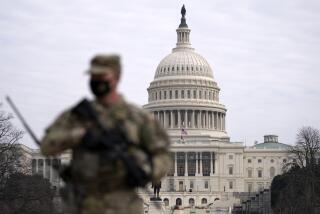House seeks expanded terror insurance plan
- Share via
WASHINGTON — The House on Wednesday defied a White House veto threat and voted to expand a post-Sept. 11 terrorism insurance program. It is an issue that has sparked a rare clash between the president and his usual business allies.
The measure would enlarge the program, which provides a federal backstop to insurance companies in the event of future attacks. It also would extend the $100-billion program, set to expire at the end of this year, by 15 years.
The bill passed easily, 312 to 110. The Senate has yet to act on similar legislation, but some form of the measure is expected to clear Congress.
Aides to President Bush have said they would recommend that he veto the bill if it is sent to him as currently drafted. That would put him at odds with Marc Racicot, a longtime political friend and former chairman of the Republican National Committee who is president of the American Insurance Assn. Also opposed to a veto would be an array of business groups that have contributed millions of dollars to Bush’s presidential campaigns.
In addition, the National Football League, concerned about the possibility of stadiums being singled out for attacks, has lent its backing to the bill.
Kurt Pfotenhauer, a lobbyist for the Mortgage Bankers Assn., said he sees the veto threat as positioning for negotiations with Congress. “I suspect we’re still going to get a piece of legislation on his desk, and that it’s one he’ll be able to sign.”
Bush supported the program when it was established in 2002, shortly after the Sept. 11 attacks. But the White House has said that it was meant only to give the insurance industry time to adapt to the threat of terrorism.
The White House budget office said in a statement that the bill would effectively make the program permanent and “expands the scope of coverage well beyond the point where it is needed.”
The measure’s proponents argue that it is still needed. Without the backstop of federal insurance, they say, businesses would have difficulty securing the financing needed for projects at or near potential high-profile targets for terrorists.
“Should we concede defeat to Osama bin Laden?” Rep. Gary L. Ackerman (D-N.Y.) asked during House debate. “Should he dictate where we can and cannot build? . . . If we cannot build and rebuild in the areas where terrorists attack, that’s a major defeat for our country.”
But Rep. Jeb Hensarling (R-Texas) countered: “If we vote for this, we are voting for a de facto permanent huge government insurance program.”
Rep. Spencer Bachus of Alabama, top Republican on the House Financial Services Committee, called the bill a “great deal” for insurance companies “at the expense of taxpayers.”
“Yes, the taxpayers do pay,” responded Rep. Barney Frank (D-Mass.), the committee chairman. But he termed the program crucial to the nation’s economic security.
The fight over the insurance bill was the latest in a series of disputes between Congress and the White House over the larger issue of government spending.
Bush has long been criticized by economic conservatives for not taking a firmer stance to reduce the budget deficit. And in his new book, former Federal Reserve Chairman Alan Greenspan takes Bush to task for an “unwillingness to wield his veto against out-of-control spending.”
But the president’s more recent efforts to crack down on spending have run up against the priorities of the Democratic-controlled Congress. And at times, Bush’s objections have put him at odds with lawmakers from his own party who face reelection.
Next week, the Senate is expected to defy a White House veto threat and approve a massive water bill filled with projects sought by lawmakers for their districts. The House last month approved the $20-billion measure by an overwhelming 381-40 vote, far more than the two-thirds majority required to override a veto.
In Wednesday’s House vote on the insurance program, 88 Republicans joined 224 Democrats in supporting the bill.
Under its provisions, the government would step in when insured losses reach $50 million, down from the current $100 million. The Sept. 11, 2001, attacks caused an estimated $35 billion of insured losses. The program would remain capped in perpetuity at $100 billion.
The bill would expand coverage to include losses resulting from domestic terrorism, and would add group life insurance to the program. It also would require private insurers to offer coverage for nuclear, biological, chemical or radiological acts of terrorism.
Pete Sepp of the National Taxpayers Union, a watchdog group, said that when the program was created, his group expressed skepticism about congressional assurances that it would be temporary.
“How sad to discover we’re right,” he said.
--
More to Read
Get the L.A. Times Politics newsletter
Deeply reported insights into legislation, politics and policy from Sacramento, Washington and beyond. In your inbox twice per week.
You may occasionally receive promotional content from the Los Angeles Times.











